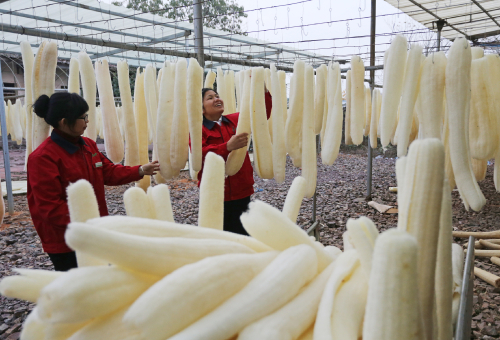 |
|
LUCRATIVE HARVEST: Workers dry up loofah sponges in Fuzhou, Jiangxi Province. Loofah production and export has greatly increased local income (WAN XIANG) |
Interbank Forex Market
China's foreign exchange regulator announced on December 10 that it will facilitate financial institutions to enter the interbank foreign exchange market.
China's State Administration of Foreign Exchange (SAFE) said the regulation would hopefully promote a market-oriented and more transparent interbank foreign exchange market.
The advance-access permission for financial institutions to enter the interbank foreign exchange market will be scrapped, allowing the market to play a more definitive role.
SAFE said that it would strengthen supervision over interbank foreign exchange and clarify the trading rules. The regulation will take effect on January 1, 2015.
No Preferential Taxes
China will not allow local taxation authorities to implement preferential tax policies, according to a statement released on December 9 by the Central Government's website.
The State Council recently issued a notice regarding trimming local preferential tax measures that may impair market mechanisms and macro controls, in some cases leading to international trade frictions.
The statement stressed a more orderly and open market and the fight against regional protectionism, seeking to eliminate the barriers hindering market free flow and allow the market dominance in resource distribution.
Adhering to the tax statutory principle, the regulation bans any form of preferential tax policies without approval by the State Council, except for the tax administrative privilege set by law.
The notice also demanded higher standards for managing non-tax revenues from selling land, state-owned assets and illegal exemption from compulsory fees.
Meanwhile, fiscal expenditure shall be strictly arranged to abolish any kind of illegal returns, subsidies and discounts.
The notice set a deadline for local governments to give detailed reports on their regulation processes to the Ministry of Finance by the end of March 2015.
Startup Boom
The simplification of China's business registration rules has led to a startup boom, with more than 2.8 million new companies established since the rules took effect in March, an increase of 54 percent year on year.
Meanwhile, the total registered capital of the new companies amounted to 14.83 trillion yuan ($2.42 trillion), up 93 percent, the State Administration for Industry and Commerce said on December 8.
The new rules have freed up the private sector in particular. In November alone, more than 350,000 new firms were established, of which nearly 95 percent were private companies.
The service sector saw the fastest increases in the number of new companies, with nearly 277,900 being set up in November.
The State Council announced in February that it would reform business registration by scrapping previous requirements on minimum registered capital for startups and simplifying approval procedures.
